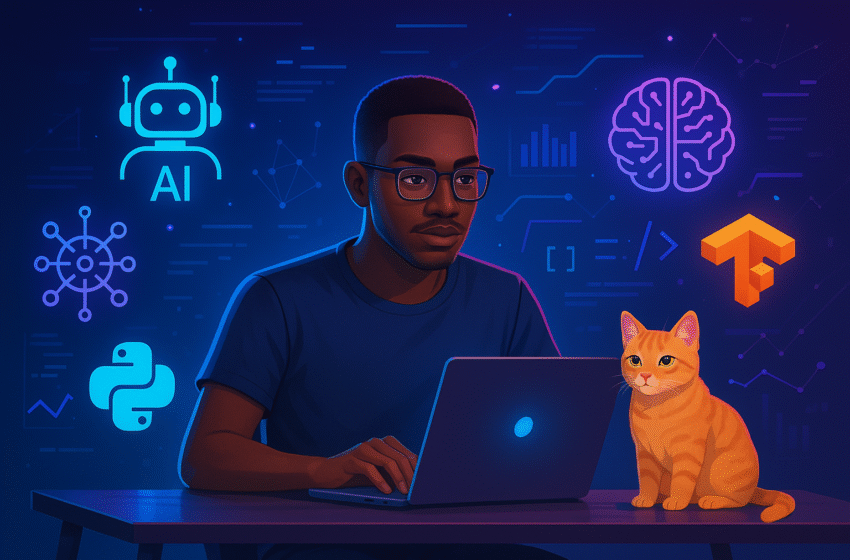
Let’s be honest—Artificial Intelligence (AI) and Machine Learning (ML) have evolved from buzzwords to essential tech skills in 2025. As someone who writes, lives, and breathes the pulse of technology for HowTub Magazine, I can confidently say this: If you’re not learning AI now, you’re already falling behind.
But the good news? You don’t need a PhD in Data Science to get started. In this in-depth, beginner-friendly guide, I’ll walk you through how to learn AI and machine learning from scratch in 2025—even if you’ve never written a line of code.
Why You Should Learn AI and Machine Learning in 2025
Let’s start by answering the real question—why now?
From personalized marketing to smart healthcare and self-driving cars, AI is literally reshaping how the world works. In fact, according to Gartner, 80% of business and tech workflows will be influenced by AI by the end of 2025.
Here’s what that means for you:
- More job opportunities in high-demand fields
- Remote freelance gigs in AI product development
- Startup potential for building AI-powered apps
- Automation skills to improve any business or workflow
Even students, digital marketers, and content creators are now adding machine learning to their skillset to stay competitive.
What’s the Difference Between AI and Machine Learning?
You’ll often see these terms used interchangeably, but they’re not exactly the same.
- Artificial Intelligence (AI) is the broader concept—machines simulating human intelligence (like ChatGPT, voice assistants, etc.).
- Machine Learning (ML) is a subset of AI that allows systems to learn from data and improve on their own—without being explicitly programmed.
So when you learn ML, you’re actually diving deeper into how AI works.
Step-by-Step Roadmap: Learn AI and ML from Scratch (2025 Beginner’s Path)
If I were starting from zero today, here’s exactly how I’d go about it:
Step 1: Master the Fundamentals of Python
Python is the number one language used in AI development. It’s beginner-friendly and insanely powerful.
Recommended Platforms:
- Python.org
- Codecademy’s Python Course
- FreeCodeCamp’s Python Tutorials
Pro Tip: You don’t need to be an expert in Python. Just understand loops, functions, data types, and object-oriented programming.
Step 2: Get Familiar with Math Basics
Before you run from the word “math,” know this—you don’t need to be a mathematician. Just grasp the essentials:
- Linear Algebra
- Probability and Statistics
- Basic Calculus
Learn from:
- Khan Academy (Free)
- Mathematics for Machine Learning by Imperial College (Coursera)
Step 3: Take an Intro to AI/Machine Learning Course
Now that you’ve built your foundation, it’s time to enter the real world of AI.
Top Courses to Consider in 2025:
- Google AI for Beginners (Free, top-rated)
- Andrew Ng’s Machine Learning Course on Coursera
- Udemy’s “AI A-Z™” Course – Updated for 2025
- Harvard’s CS50 AI Track
These are highly recommended, even by professional developers who want to switch into AI. Stick with any one and commit 2–3 hours weekly.
Step 4: Work on Real-Life AI Projects (Even Small Ones)
Learning by doing is your best bet. Once you understand the basics, start building.
Easy beginner-friendly AI project ideas:
- Spam email classifier
- Movie recommendation system
- AI chatbot using Python
- Facial recognition app
Use tools like Jupyter Notebook, Google Colab, and TensorFlow Lite for free experimentation.
Step 5: Explore AI Frameworks & Libraries
By now, you’ll want to learn how actual developers build systems.
Top Libraries to Learn in 2025:
- TensorFlow (Google-backed and powerful)
- PyTorch (Great for deep learning)
- Scikit-learn (For traditional machine learning models)
- Keras (Beginner-friendly for neural networks)
Step 6: Join AI Communities and Stay Updated
AI evolves every month. Don’t go it alone.
Communities that support beginner learning:
- Reddit: r/MachineLearning
- Kaggle (Great for real datasets and competitions)
- Discord AI study groups
- Twitter/X threads from AI influencers
And of course, follow blogs like HowTub.com for tips, news, and trends curated for tech-savvy beginners.
Bonus: Top AI Career Paths You Can Start Learning Now
If you’re serious about AI, these job paths are exploding in 2025:
| Job Title | Avg. Salary (2025 est.) | Needed Skills |
|---|---|---|
| Machine Learning Engineer | $130,000+ | Python, TensorFlow, ML concepts |
| Data Scientist | $120,000+ | Statistics, Data Mining, AI Models |
| AI Product Manager | $110,000+ | Project Management + AI Basics |
| Prompt Engineer | $90,000+ | NLP, Prompt Design, ChatGPT |
Even if you’re just starting out, these roles are achievable within 6–12 months of committed learning.
Final Thoughts From Me
When I first got into tech writing, AI was a niche. Now, it’s a necessity. And as someone who works closely with startups, developers, and tech educators, I can tell you this: Learning AI in 2025 could be the smartest career move you make.
It’s not too late. In fact, this is the perfect time. You already have what it takes—you just need to take the first step.
If you found this guide helpful, feel free to bookmark it, share it, and dive into more tech-powered how-tos over at HowTub.com, where I break complex ideas into practical insights for everyday learners like you.
Frequently Asked Questions (FAQs)
Q: Can I learn AI without a computer science degree?
Absolutely. Many successful AI developers started with just a passion and a YouTube playlist.
Q: How long does it take to learn AI and ML?
On average, 3 to 9 months, depending on how much time you dedicate weekly.
Q: What’s the best AI course for beginners in 2025?
Google’s free “Machine Learning Crash Course” is a strong place to start.
